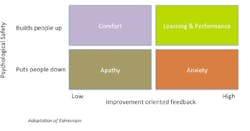The Upside of Speaking Up
I have nothing but admiration for my clients who go through a narrative 360 feedback with me. But I am often left wondering how the candid perspectives that their work colleagues share during my interviews so often come as a surprise.
Why do otherwise friendly and supportive coworkers starve each other of the very information that will help them grow and succeed? Put another way, why are they complicit in their failure?
The answer to such questions is that we don’t share certain perceptions because we fear that it will cost us relationship capital. But this is a huge missed opportunity, both because learning-oriented feedback is too valuable to withhold, and because sharing such insights in the right way will actually make relationships stronger.
We have recently seen a flurry of research showing how the brain responds to all-too-typical management behavior. Using fMRI technology, neuroscientists can now see how a person’s brain ‘lights up’ as though physically threatened, or even experiencing pain, when they feel socially outcast, criticized, talked down to, evaluated or faced with change.
The collective thrust of neuroscientists’ advice to managers is to minimize employees’ threat response and promote reward responses in the brain via the opposite of the threat triggers above. We’re supposed to encourage inclusion, play up strengths, ask others to decide, give praise and manage change.
Google’s research into the characteristics of its own high performing teams offers further insights. After years of analysis they concluded that “psychological safety” is what differentiates their best performing teams. Not smarter people. Not harder work. Not clear decision-making authority or other popular management advice.
But isn’t there a problem if we follow this advice? If our concern about offending dominates, aren’t we likely to fall into that trap of starving our colleagues of the very information they need to succeed?
While listening to others’ perceptions of us can feel threatening, there is much evidence that ‘upsetting’ our brains is good for both learning and relationships if it is done well.—Chris Morgan
Amy Edmonson, a professor at Harvard who came up with the term psychological safety, says this fear of speaking the truth can manifest in a wide range of circumstances with severe consequences. She points to nurses who don’t let the doctors know that they have a drug dosage wrong, to flight instructors who aren’t corrected by colleagues when they give the wrong instructions, and to executives who go along with transactions they know to be flawed.
I would argue that we need to do more than avoid generating a threat response. Business leaders and managers need to consider how we can bring about change for the better in spite of such a response. While listening to others’ perceptions of us can feel threatening, there is much evidence that ‘upsetting’ our brains is good for both learning and relationships if it is done well. Here are just a few examples:
- Learning is energizing - We love to learn, and we are grateful for those that help us. There is perhaps nothing more energizing - and also threatening - than learning new skills, knowledge and experience, whether sports, music, cooking, crafts, philosophy or new technologies.
- Struggle rewires the brain - Research shows that we need struggle and practice repeatedly to strengthen the neural pathways in order to acquire new knowledge or skill. Neuroscientists can now observe the brain’s changing structure as people learn (Myelin wrapping around nerve fibers).
- Emotional intelligence means tough love - The leading “emotional intelligence” researchers say the concept has been too narrowly defined. In this month’s issue of Harvard Business Review, Goleman and Boyatzis offer the example of a young woman who is excellent at sociability, sensitivity and likability, but is limited in her ability to deliver tough feedback and is reluctant to ruffle people’s feathers. This builds on an earlier HBR piece titled, The Downsides of Being Very Emotionally Intelligent.
- Mindset matters - Carol Dweck’s seminal work on the Growth Mindset, points out the dangers of focusing on the positive. She explains that people who are concerned with looking good tend to seek out favorable assessments and avoid negative judgments. By contrast people who have a learning orientation are curious and open to improvement ideas. Her research shows that the latter are the ones who succeed.
- Stress can be managed - We should not think of the threat response in the brain as inherently bad. In one of Kelly McGonigal’s studies participants were trained to consider their symptoms of stress (heart rate, breathing and oxytocin in the brain) as helpful in readying them for action. When put in a stressful situation they experienced their elevated state as exciting and even joyful. Further, none of the typical constriction of blood vessels associated with stress that can lead to chronic illness was observed.
- Maintain a positive attitude - Our attitude to stress matters both in how we receive feedback and how we give it. Another fMRI study shows that improvement-oriented feedback delivered with a positive attitude does not provoke a threat response, whereas even positive feedback delivered with a negative attitude did evoke fear.
- Constructive feedback builds relationships - Finally, well-delivered feedback makes people feel happy, energetic and safe. Feedback is a way of making social connection and collaborating, it imparts a sense of agency, it can be fun problem-solving, and it can allow us to reveal our authentic and vulnerable selves. These are all aspects of feedback that build stronger relationships.
Build people up: A Simple but Vital Distinction
In my experience, delivering the kind of feedback that will bring about positive change requires business leaders and managers to pay attention to two dimensions: psychological safety and honesty. Not one or the other, but both dimensions. Safety without feedback builds comfort. Feedback without building people up creates anxiety and kills creativity and energy.
Balancing each dimension can help drive the change that business leaders and managers are looking for. Psychological safety creates a context in which leaders can instigate a more honest, creative and improvement-oriented discussion. This model (see diagram below) is helpful both to feedback givers as well as receivers.
Requesters be sure to ask for feedback. People know that giving unsolicited advice is not always welcomed, but they will respond to genuine requests for advice. It is easier for others to respond to requests about specific events than general strengths and improvement opportunities; how to refine a presentation you gave, a meeting you ran, an interaction you had, a competence you are working on. When someone does show the courage of sharing their candid perceptions, listen with curiosity (even as your threat response may trigger) and thank them.
Such advice reflects the emotional and mental fortitude my clients have shown me. It takes courage and vulnerability to listen and hear beyond the initial embarrassment. When it comes to digesting suggestions of how they can be more effective, I am amazed at my clients’ ability to hear the improvement opportunities as an expression of support, to take these issues on as a problem to solve.
As a leadership coach I do everything I can to make my clients feel safe, supported and to build on their strengths, but I also provide them with an honest reflection of how others believe they can become even more effective. My clients are usually shaken and their threat responses are activated, which is a good thing. If they are not shaken, then they are unlikely to make a commitment to take their strengths to a new level and to address the criticisms - head on. In every case, they have appreciated the process of receiving candid feedback, and the opportunity to take actions that help them grow and succeed.


